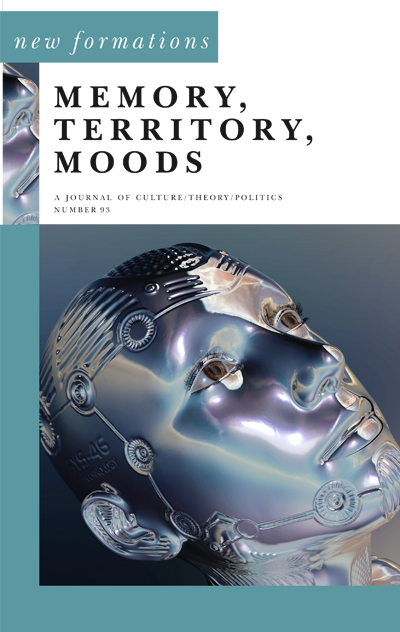
Eco-catastrophe, arithmetic patriotism and the Thatcherite promise of nature
New Formations - Print ISSN 0950-2378 - Online ISSN 1741-0789
Volume 2018 Number 93
Eco-catastrophe, arithmetic patriotism and the Thatcherite promise of nature
Michael Gardiner
DOI: 10.3898/NEWF:93.04.2017
Abstract
This essay describes how the renovated 1970s liberalism that would become a major thread of Thatcherism grew on the back of public perceptions of crisis, and adapted worries about ecology to worries about ‘financial ecology’, or money supply. The natural conditions of money movement have a particular place in the British constitution as the original basis of authority for the 1688 state, when Newtonian ideas of eternal laws of physics were ‘financialised’ by John Locke. In this thinking, the property basis of citizenship itself is nature, and must be underwired by universal terms of exchange following natural rules. Although Thatcherism has often been described as an alien credo, it was largely enabled by this promise of a return to a financial natural law. In the terms borrowed from Luc Boltanski by William Davies, it returns to a ‘political physics’ which now takes on a moral role preventing catastrophe, or an ‘economic patriotism’ seen to protect the constitution from political force. The 1970s return to Locke’s understanding of nature builds on and repurposes visions of the catastrophic in popular culture, fiction, children’s books and TV, which I describe here. It begins with those eco-catastrophes that describe a ‘disaster of nature’, which it sees as also including the disaster of the property-producing role of labour, in the ‘despotic’ role of trade unions, and the perceived threat to money as a universal measure, a disaster that would increasingly be given an arithmetic measure in inflation. For key liberal or neo-Lockean think-tanks of the mid1970s, the attack on natural law by despotic power, measured in inflation, could be seen as a mass erosion of individual responsibility, as dystopian, and as always calling for a restoration of the balances of nature. The result is a permanent and quotidian vigilance over threats to nature that sees their solution, paradoxically, as the creation of more property. Understanding this binding between nature and property in the constitution that gave rise to Anglophone capitalist modernity also helps give a fix on the way stories of ecological disaster can, as Frederick Buell has described, themselves be given values and repurposed for increased consumption.
SORRY - you are not registered as being permitted online access to the full text of this article
You have the following options:
- If you are viewing this via an institution or academic library you can ask that your institution takes out a Subscription to this journal.
- If you already have a Personal Subscription please login below
Forgotten your username / password? Click here to locate
- Purchase an annual Personal Subscription
PRINT + DIGITAL personal subscription (£45 / year)
DIGITAL personal subscription (£30 / year)
A Personal Subscription provides immediate access not only to the single article you are seeking, but also to all past and future articles in this journal up to the expiry of your annual (calendar year) subscription. - Purchase immediate access to this single article (UK£7.00) - Buy article Coming Soon
To cite this article
Michael Gardiner (2018) Eco-catastrophe, arithmetic patriotism and the Thatcherite promise of nature, New Formations, 2018(93). https://doi.org/10.3898/NEWF:93.04.2017
